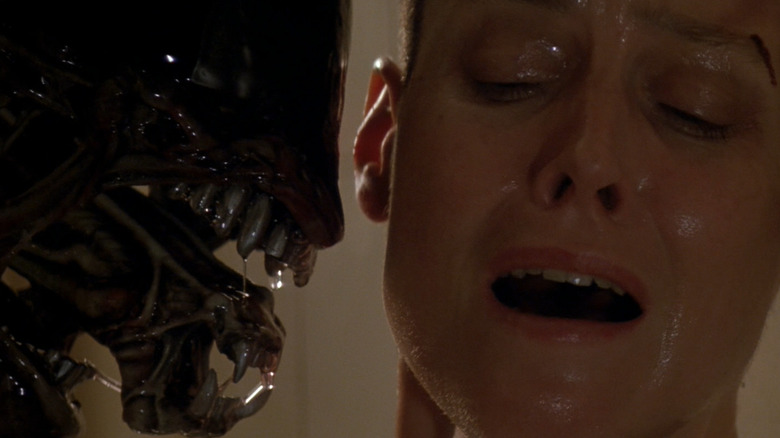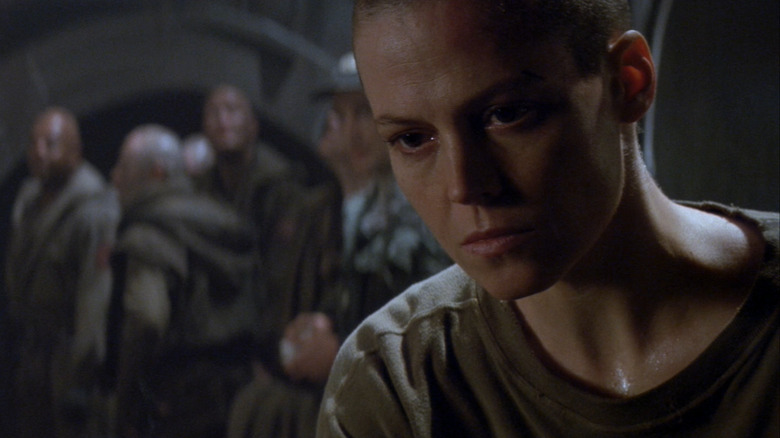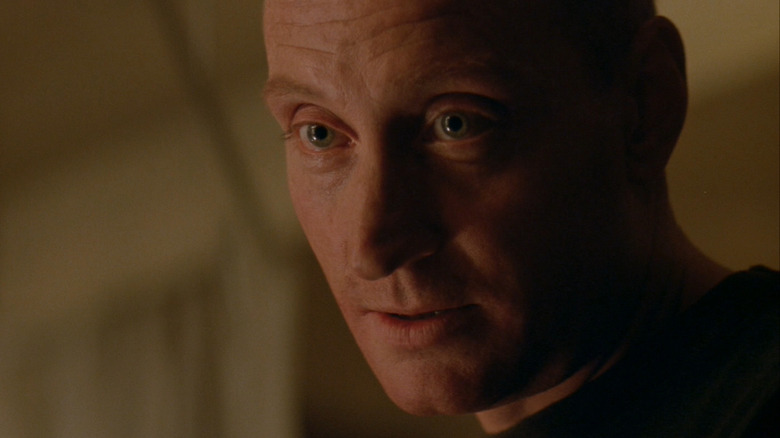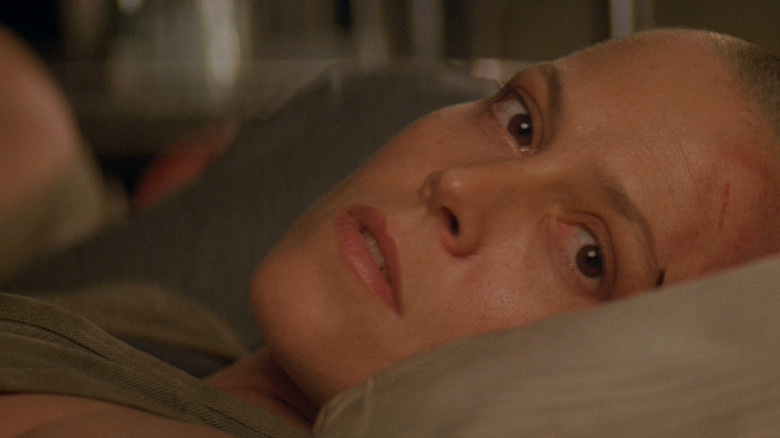Why The Alien 3 Production Was Such A Nightmare
The troubled production of "Alien 3" is the stuff of Hollywood legend. The sequel to "Alien" and "Aliens" marked the feature film directorial debut of David Fincher. While the filmmaker would go on to establish himself as a modern master, at that time, he was still just a young, untested filmmaker known mostly for his work in music videos.
"Alien 3" was already chasing a release date when Fincher boarded the project, taking over from outgoing director Renny Harlin rather late in the process, so he only had five weeks of prep time. According to Film Stories, the movie was originally scheduled to have a 12-month turnaround, from the start of production in January 1991 to a theatrical release in December 1991. The Christmas deadline was soon extended, but even before the story was finalized, an infamously misleading teaser trailer announced, "In 1992, we will discover, on Earth, everyone can hear you scream."
As anyone who's seen the film can attest, Earth was not, in fact, the setting. They began shooting without a completed script, partly because "Alien 3" had already undergone numerous rewrites and no one could seem to get it perfectly tailored. William Gibson, author of the Hugo and Nebula award-winning cyberpunk novel, "Neuromancer" (which influenced "The Matrix"), wrote a draft that kept Ripley (Sigourney Weaver), the Oscar-nominated heroine of the first two movies, in a coma. It instead centered on the space Marine, Hicks, and the robot, Bishop, played by Michael Biehn and Lance Henriksen, whose characters were left alive at the end of "Aliens."
This version has since gone on to become an Audible original audio drama, with Biehn and Henriksen reprising their roles as Hicks and Bishop through voice work.
Too Many Cooks
Eric Red ("The Hitcher," "Near Dark") whipped up the next version of the script for "Alien 3" in under two months, and it was set on Earth (hence that teaser about screaming there), but it was quickly discarded. Then there was David Twohy's prison planet version, developed alongside Vincent Ward and John Fasano's legendary wooden planet version, where the setting was a kind of monastery in space.
Producers David Giler and Walter Hill and script doctor Larry Ferguson eventually fused elements of these last two versions into what became the working draft of "Alien 3," with Fincher and his own uncredited script doctor, Rex Pickett, doing further rewrites. All told, there were reportedly ten different writers on the film. While other classic movies like "The Wizard of Oz" have juggled that many writers in the past, "Alien 3" could not be termed anything other than a cult classic at best.
Charles Dance, who played Clemens, the prison planet's doctor, in "Alien 3" told SFX that what made it to the screen also differed greatly from what was on the page. Dance has since achieved more global recognition for his role as Tywin Lannister on "Game of Thrones." When it comes to his time on "Alien 3" and its production, he said:
"Look, it wasn't a nightmare, despite what you may have read or heard elsewhere. But it certainly wasn't an easy shoot. What was on the screen was quite removed from what was in the script. But, with that said, I don't regret that I was a part of it. I mean, I knew going into 'Alien 3' that this was a big franchise picture – and there are a lot of cooks in the kitchen on these things."
Fincher's "First Bungled Masterpiece"
Over the years, Fincher has made various public comments about "Alien 3," beginning with the summer of its release when he told The Independent, "If I go on to make 10 great [movies], this'll probably be looked upon as my first bungled masterpiece."
It was still a sore subject with him in 2009 when he spoke to The Guardian while promoting "The Curious Case of Benjamin Button," at which time, he said, "To this day, no one hates ['Alien 3'] more than me." He described the experience of making the movie as "a baptism by fire" where he learned "to be a belligerent a**hole" so as not to have his voice reduced to white noise, like Charlie Brown's teacher in "Peanuts."
In 2017, the year of the film's 25th anniversary, the subject of "Alien 3" again came up during Fincher's sit-down with BAFTA Guru, where he joked, "I didn't like the script, but I love 'Alien,' so yeah, I signed up, naive, and went off to Pinewood [Studios] to be sodomized ritualistically for two years." When asked to elaborate on what the problem was, he said:
"There's no one problem with a $65-million, f***ed-up, first-time filmmaker. Look, I made a crucial error. I listened to the people who were paying for the movie, and they said, the way to go about this is not to work with your friends. The way to go about this is to work with people who have done this time and time and time again. And basically, that translates into: meet a lot of people who are going to resent you and your age and are not going to want to take instruction from you, and allow them to tell you what you can't do."
Fox and the Organ Grinder's Monkey
Fincher's offhand prediction about making 10 great movies turned out to be pretty accurate. In 2020, while promoting his eleventh film, "Mank," the director alluded again to the trouble he experienced with 20th Century Fox on "Alien 3." In an interview with Vulture, he characterized it as a situation where he "was a hired gun to make a library title for a multinational, vertically integrated media conglomerate."
Speaking to The Daily Beast (via CinemaBlend), Dance painted a further picture of what it was like for Fincher to be working at Pinewood in England while Fox executives were breathing down his neck from Hollywood during the production of "Alien 3." As he put it, "Fincher had the studio on his back the whole time phoning him at all hours of the day and night—not taking into account the time change."
Dance also lamented to SFX that Clemens, a rare consummated love interest for Ripley, was killed off early in "Alien 3." He acknowledged that there were problems, but felt he was in good hands with Fincher, saying:
"The minute David Fincher first walked onto the set I thought, 'My god, this guy is going to go far.' He was fantastic – and I hope that I get to work with David again at some point. He was dealing with a lot of outside interference on that movie."
Fincher and Dance would indeed reunite for "Mank," with Dance's character, William Randolph Hearst (based on the real-life media tycoon), giving one memorable monologue likening a screenwriter to an organ grinder's monkey. Whatever you think of "Alien 3," it's clear there were a lot of different organs grinding, not all of them in tune with each other, as the studio sought to churn out this particular sequel.



